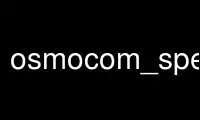
This is the command osmocom_spectrum_sense that can be run in the OnWorks free hosting provider using one of our multiple free online workstations such as Ubuntu Online, Fedora Online, Windows online emulator or MAC OS online emulator
PROGRAM:
NAME
osmocom_spectrum_sense - GNU Radio application from OsmoSDR
SYNOPSIS
osmocom_spectrum_sense [options] min_freq max_freq
DESCRIPTION
GNU Radio application from OsmoSDR
OPTIONS
-h, --help
show this help message and exit
-a ARGS, --args=ARGS
Device args [default=]
-A ANTENNA, --antenna=ANTENNA
Select antenna where appropriate
-s SAMP_RATE, --samp-rate=SAMP_RATE
Set sample rate (bandwidth), minimum by default
-g GAIN, --gain=GAIN
Set gain in dB (default is midpoint)
--tune-delay=SECS
Time to delay (in seconds) after changing frequency [default=0.25]
--dwell-delay=SECS
Time to dwell (in seconds) at a given frequency [default=0.25]
-b Hz, --channel-bandwidth=Hz
Channel bandwidth of fft bins in Hz [default=6250.0]
-q dB, --squelch-threshold=dB
Squelch threshold in dB [default=none]
-F FFT_SIZE, --fft-size=FFT_SIZE
Specify number of FFT bins [default=samp_rate/channel_bw]
--real-time
Attempt to enable real-time scheduling
Device specification
You can specify the source or sink device using a comma separated string of argument=value
pairs. The always-up-to-date block documentation with examples is available right here.
FCD Source
Argument
Notes
fcd=<device-index>
0-based device identifier, optional
device=hw:2
overrides the audio device
type=2 selects the dongle type, 1 for Classic, 2 for Pro+
The "device" argument overrides the audio device used by the underlying driver to access
the dongle's IQ sample stream.
The "type" argument selects the dongle type, 1 for Classic, 2 for Pro+.
OsmoSDR Source
Argument
Notes
osmosdr=<device-index>
0-based device identifier
buffers=<number-of-buffers>
Default is 32
buflen=<length-of-buffer>
Default is 256kB, must be multiple of 512
RTL-SDR Source
Argument
Notes
rtl=<device-index>
0-based device identifier OR serial number
rtl_xtal=<frequency>
Frequency (Hz) used for the RTL chip, accepts eng notation
tuner_xtal=<frequency>
Frequency (Hz) used for the tuner chip, accepts eng notation
buffers=<number-of-buffers>
Default is 32
buflen=<length-of-buffer>
Default is 256kB, must be multiple of 512
direct_samp=0|1|2
Enable direct sampling mode on the RTL chip. 0: Disable, 1: use I channel, 2: use Q
channel
offset_tune=0|1
Enable offset tune mode for E4000 tuners
NOTE: use rtl_eeprom -s to program your own serial number to the device
NOTE: if you don't specify rtl_xtal/tuner_xtal, the underlying driver will use 28.0MHz
RTL-SDR TCP Source
Argument
Notes
rtl_tcp=<hostname>:<port>
hostname defaults to "localhost", port to "1234"
psize=<payload-size>
Default is 16384 bytes
direct_samp=0|1|2
Enable direct sampling mode on the RTL chip 0=Off, 1=I-ADC input enabled, 2=Q-ADC
input enabled
offset_tune=0|1
Enable offset tune mode for E4000 tuners
Miri Source
Argument
Notes
miri=<device-index>
0-based device identifier
buffers=<number-of-buffers>
Default is 32
UHD Source / Sink
Argument Notes
uhd Use this argument without a value
nchan=<channel-count>
For multichannel USRP configurations use the subdev parameter to specify stream
mapping
subdev=<subdev-spec>
Examples: "A:0", "B:0", "A:0 B:0" when nchan=2. Refer original ettus documentation
on this
lo_offset=<frequency>
Offset frequency in Hz, must be within daughterboard bandwidth. Accepts eng
notation
Additional argument/value pairs will be passed to the underlying driver, for more
information see specifying the subdevice and common device identifiers in the Ettus
documentation.
bladeRF Source / Sink
Argument
Notes
bladerf[=0]
0-based device identifier (optional)
fw='/path/to/the/firmware.img'
program MCU firmware from given file. usually not needed. power cycle required.
fpga='/path/to/the/bitstream.rbf'
load FPGA bitstream from given file. required only at first run at the moment.
HackRF Source / Sink
Argument
Notes
hackrf Use this argument without a value
buffers=<number-of-buffers>
Default is 32
Only the first device found may be used at the moment because of libhackrf limitation.
Transmit support has been verified by using the crc-mmbTools DAB sdr transmitter.
IQ File Source
Argument
Notes
file=<path-to-file-name>
freq=<frequency>
Center frequency in Hz, accepts eng notation
rate=<sampling-rate>
Mandatory, in samples/s, accepts eng notation
repeat=true|false
Default is true
throttle=true|false
Throttle flow of samples, default is true
Use osmocom_spectrum_sense online using onworks.net services
